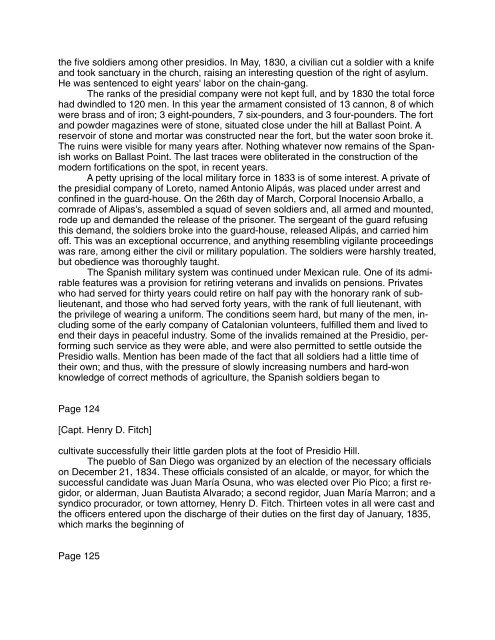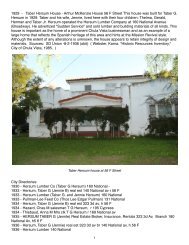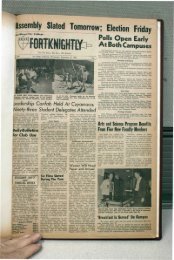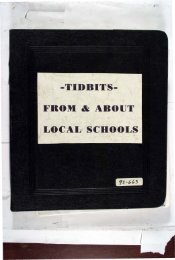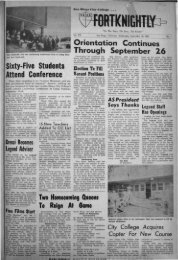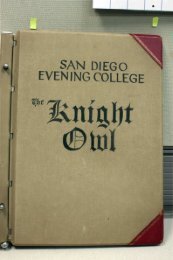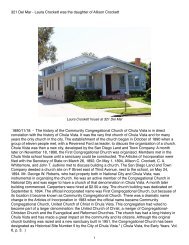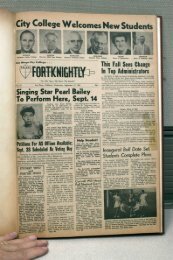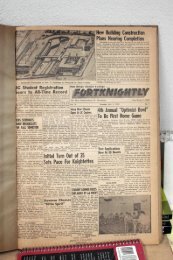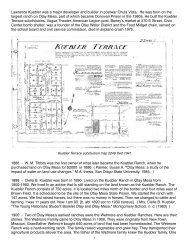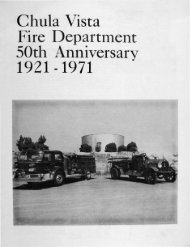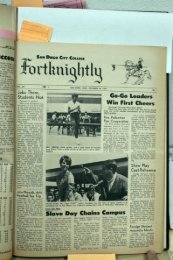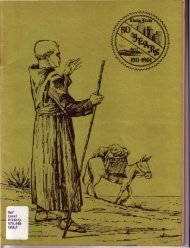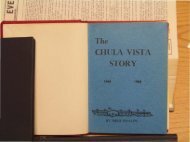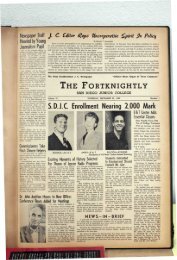doc241 - Schoenherr Home Page in Sunny Chula Vista
doc241 - Schoenherr Home Page in Sunny Chula Vista
doc241 - Schoenherr Home Page in Sunny Chula Vista
You also want an ePaper? Increase the reach of your titles
YUMPU automatically turns print PDFs into web optimized ePapers that Google loves.
the five soldiers among other presidios. In May, 1830, a civilian cut a soldier with a knife<br />
and took sanctuary <strong>in</strong> the church, rais<strong>in</strong>g an <strong>in</strong>terest<strong>in</strong>g question of the right of asylum.<br />
He was sentenced to eight years' labor on the cha<strong>in</strong>-gang.<br />
The ranks of the presidial company were not kept full, and by 1830 the total force<br />
had dw<strong>in</strong>dled to 120 men. In this year the armament consisted of 13 cannon, 8 of which<br />
were brass and of iron; 3 eight-pounders, 7 six-pounders, and 3 four-pounders. The fort<br />
and powder magaz<strong>in</strong>es were of stone, situated close under the hill at Ballast Po<strong>in</strong>t. A<br />
reservoir of stone and mortar was constructed near the fort, but the water soon broke it.<br />
The ru<strong>in</strong>s were visible for many years after. Noth<strong>in</strong>g whatever now rema<strong>in</strong>s of the Spanish<br />
works on Ballast Po<strong>in</strong>t. The last traces were obliterated <strong>in</strong> the construction of the<br />
modern fortifications on the spot, <strong>in</strong> recent years.<br />
A petty upris<strong>in</strong>g of the local military force <strong>in</strong> 1833 is of some <strong>in</strong>terest. A private of<br />
the presidial company of Loreto, named Antonio Alipás, was placed under arrest and<br />
conf<strong>in</strong>ed <strong>in</strong> the guard-house. On the 26th day of March, Corporal Inocensio Arballo, a<br />
comrade of Alipas's, assembled a squad of seven soldiers and, all armed and mounted,<br />
rode up and demanded the release of the prisoner. The sergeant of the guard refus<strong>in</strong>g<br />
this demand, the soldiers broke <strong>in</strong>to the guard-house, released Alipás, and carried him<br />
off. This was an exceptional occurrence, and anyth<strong>in</strong>g resembl<strong>in</strong>g vigilante proceed<strong>in</strong>gs<br />
was rare, among either the civil or military population. The soldiers were harshly treated,<br />
but obedience was thoroughly taught.<br />
The Spanish military system was cont<strong>in</strong>ued under Mexican rule. One of its admirable<br />
features was a provision for retir<strong>in</strong>g veterans and <strong>in</strong>valids on pensions. Privates<br />
who had served for thirty years could retire on half pay with the honorary rank of sublieutenant,<br />
and those who had served forty years, with the rank of full lieutenant, with<br />
the privilege of wear<strong>in</strong>g a uniform. The conditions seem hard, but many of the men, <strong>in</strong>clud<strong>in</strong>g<br />
some of the early company of Catalonian volunteers, fulfilled them and lived to<br />
end their days <strong>in</strong> peaceful <strong>in</strong>dustry. Some of the <strong>in</strong>valids rema<strong>in</strong>ed at the Presidio, perform<strong>in</strong>g<br />
such service as they were able, and were also permitted to settle outside the<br />
Presidio walls. Mention has been made of the fact that all soldiers had a little time of<br />
their own; and thus, with the pressure of slowly <strong>in</strong>creas<strong>in</strong>g numbers and hard-won<br />
knowledge of correct methods of agriculture, the Spanish soldiers began to<br />
<strong>Page</strong> 124<br />
[Capt. Henry D. Fitch]<br />
cultivate successfully their little garden plots at the foot of Presidio Hill.<br />
The pueblo of San Diego was organized by an election of the necessary officials<br />
on December 21, 1834. These officials consisted of an alcalde, or mayor, for which the<br />
successful candidate was Juan María Osuna, who was elected over Pio Pico; a first regidor,<br />
or alderman, Juan Bautista Alvarado; a second regidor, Juan María Marron; and a<br />
syndico procurador, or town attorney, Henry D. Fitch. Thirteen votes <strong>in</strong> all were cast and<br />
the officers entered upon the discharge of their duties on the first day of January, 1835,<br />
which marks the beg<strong>in</strong>n<strong>in</strong>g of<br />
<strong>Page</strong> 125


